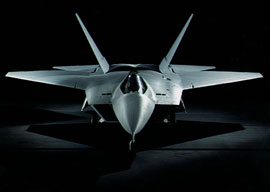
September 27, 2013

F22 Raptor
A prototype was duly built. Early flight trials began. It was then discovered by the investigative reporter Nickolas Fervently of The New York Times that due to a design error, the guns of the Rabid Bat pointed backward. A redesign, his sources had told him, would cost about $345 billion.
A flap ensued. It sufficiently threatened the flow of funds that Lockheed’s CEO, E. Johnston Farad, called a press conference. “It is necessary to understand the truly revolutionary nature of this aircraft,” he said. “It is so stealthy that the enemy will not detect the Rabid Bat until it has dropped its bomb load. Consequently it will only use its guns to fire backward at a pursuing enemy.” Congress was so impressed by this advance that it increased the purchase by forty aircraft.
Critics persisted in pointing out that the Rabid Bat was simply unnecessary. Moslem goat-herders were already being efficiently slaughtered by psychopaths sitting at screens in the CIA headquarters in Langley, Virginia. Lockheed responded that by pure happenstance, parts for the plane were to be manufactured in all fifty states, creating jobs. The plane was thus seen by all fifty governors to be essential to national security.
Reporter Fervently of the NYT looked suspiciously at the massive plant being built in West Virginia to make special tires for the plane. Production would be 431 tires per Rabid Bat per year. He wrote a column suggesting that the Rabid Bat would be the first combat eighteen-wheeler. He was dismissed as a crank. Surely, said Lockheed, it never hurt to have enough tires.
Conservative senators replied that Fervently obviously hated America and wanted it conquered and enslaved by enemies surrounding the country. Fervently pointed out that the United States was surrounded by Mexico, Canada, and two oceans. Mexico would not conquer America and thus disrupt its biggest drug market, and Canadians needed overflight rights to Cancun in winter. These considerations ensured amity.
The noted military scholar Damian Isby at the Rand Corporation circulated an eyes-only paper saying that the Rabid Bat’s military irrelevance was vital to the health of the defense industry and thus to national security. To the arms makers, he said, victory and defeat were equally odious, as both reduced the purchase of weaponry. A good war was an interminable war. The Rabid Bat, having no military purpose, would not upset the balance with the Taliban and would thus keep America free.
Serial production began. The Republic was safe.